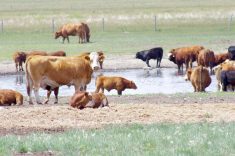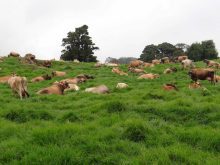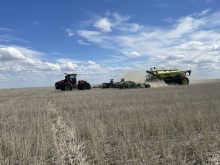It was standing room only at the Canadian Wheat Board (CWB) meeting held at the exhibition grounds in Medicine Hat Aug. 15, with about 300 mostly pro-CWB people in attendance. The meeting was one of seven held across the Prairies by the CWB to discuss directly with grain growers issues surrounding the government’s intention to change the mandate of the board.
The message of the evening was that this is not your father’s, or grandfather’s, CWB and it’s worth fighting for. CWB directors present stressed that they would abide by farmers’ wishes, as expressed in the current plebiscite. They focused on what will be lost if the vote is not for a single-desk agency, and stressed that the board cannot survive in an open market.
Read Also

Lethbridge research farm lease renewed for 20 years
Lethbridge Polytechnic and the Government of Alberta have signed a 20-year renewal of a land lease agreement for the institiution’s research farm.
Gord Flaten, the CWB’s vice-president of marketing and sales, outlined the advantages of single-desk selling. He said that every one of around 4,000 contracts a year is shown to directors and the sales team walks them through the details of deals benchmarking their performance against their goal. Flaten said this information has solidified directors’ support for the single-desk system and changed one former director from an open-market proponent to a strong supporter of the single-desk model.
The CWB publishes its aggregate results, comparing their performance to their targets and discussing disparities. Flaten described the way his team used the single-desk sales advantage to return over $12 a bushel to Canadian farmers from their 2008 durum crop by delaying sales until short supplies drove up prices. Other grain traders, he said, don’t have the luxury of waiting for a shortage of a particular grain to push the market up, they may simply lose the sale. They also have no incentive to maximize prices, only to maximize their margins.
Growers at the Medicine Hat meeting spoke of North Dakota farmers who received under $8 for durum that year, although over $17 was offered later in the year, when the crop was all sold. In response, Flaten noted that grain companies operating in the U.S. tripled their profits that year.
Flaten said that to compete in an open market the CWB would need to become a grain company and be able to purchase elevators and terminals. Without help, that would be impossible since the board distributes all profits to farmers and has no retained earnings.
Producer cars threatened
As producer car shippers need a grain seller at port to accept their cars, Flaten predicted that without the CWB producer cars will disappear and short-line rail companies will not survive. His view was endorsed by a farmer-shareholder in a short-line railway who said that producer cars are no longer used for canola because grain companies no longer accept them.
Flaten also said the board can use its size and clout to negotiate better transportation deals for farmers. He said grain companies are also interested in good rail service, but the CWB has much more interest in lowering costs, and that a grain company simply passes them on to farmers.
“We negotiate for services from the railways, representing farmers’ interests and trying to lower costs,” said Flaten. “Court challenges over railway service and performance takes resources and commercial knowledge farmers and farm groups don’t have.”
The CWB played a key role in a current challenge against the rail companies for overcharging for grain shipments, something farmers wouldn’t be able to do.
“The CWB is the only entity that has the commercial knowledge, the resources and the will to push the railways to provide the services mandated and to help retain the revenue cap at an average of $40,” said CWB director Stewart Wells. “Without pressure from the CWB, the revenue cap would disappear and rates would be raised to $70 a tonne.” One grower summed the situation as, “Without the board you can kiss your you-know-what goodbye,” and was widely applauded.
The federal government acknowledges it has done no studies or analysis of the situation or alternative systems, directors told the meeting. No value has been assigned to the virtual assets of the CWB, its market knowledge, expertise and relationships.
CWB chair, Allen Oberg compared the CWB’s legislated position as sole marketing agency for western Canadian grains to John Deere’s patents. If the machinery company were to lose its patents at the stroke of a pen, he said, it would survive for a few years, but without its competitive advantages it would soon disappear.
Jeff Nielsen, a CWB director from Olds and an open market supporter, was called on to express his opinion; he declined, saying he was bound by his fiduciary duty /oath as board member not to do anything that would damage the board’s interests.
———
“Courtchallengesoverrailwayserviceandperformance takesresourcesandcommercialknowledgefarmersand farmgroupsdon’thave.”
GORD FLATEN CWB














